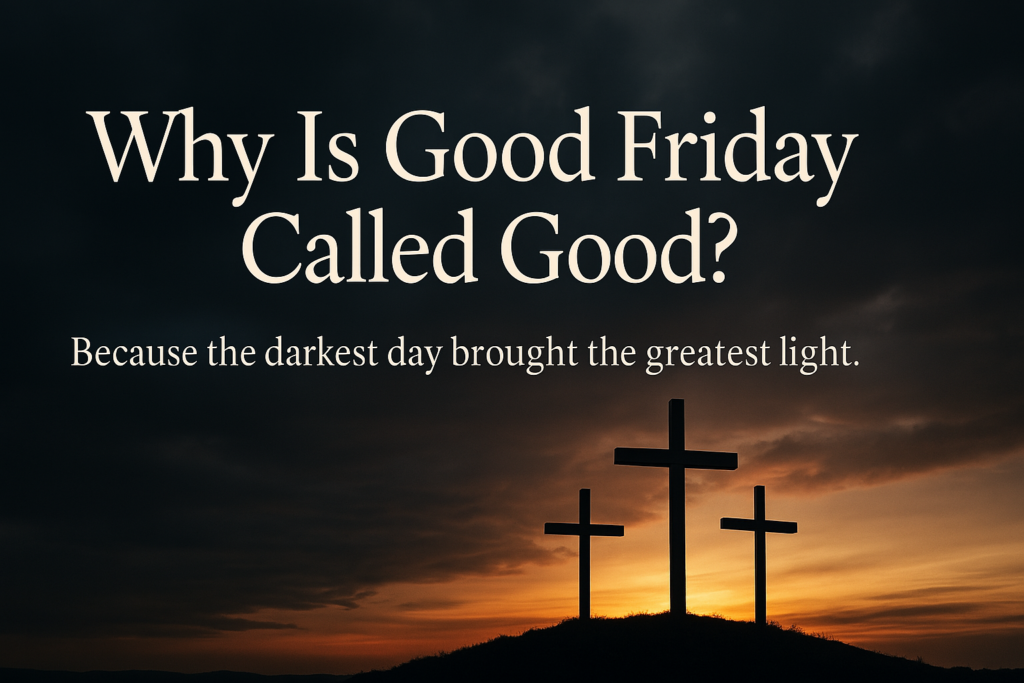Why is Good Friday Called Good Friday?
But let’s take a deeper look. Not just into theology, but into the emotional and spiritual heart of what this day represents. Because once you understand it, once it really hits you, Good Friday becomes one of the most profound and beautiful days in the entire Christian calendar.
So, Why the Name?
The term “Good Friday” has sparked debate and interest for centuries. Some historians believe that “good” was originally meant to mean “holy,” like in the term “Good Book” for the Bible. In that sense, Good Friday is “Holy Friday” the sacred day when Christ gave His life for the world. Others argue that “good” was used in its older English form, meaning “pious” or “righteous.” Either way, it’s clear that the name isn’t about celebrating suffering; it’s about what that suffering accomplished.
But here’s where it gets personal.
The Day the World Changed
If you strip it down to the historical facts, Good Friday marks the crucifixion of Jesus of Nazareth, around 30–33 A.D. It was the day Rome executed Him as a criminal. Yet Christians believe it was far more than an execution. It was the climax of a divine rescue mission.
You see, the Bible says, “All have sinned and fall short of the glory of God” (Romans 3:23, NIV). That’s not just a religious guilt trip. It’s a real assessment of the human condition. We mess up. We choose selfishness. We ignore God. We hurt others, intentionally or not. And sin creates a separation between us and our Creator.
But the story doesn’t end there. And this is where Good Friday takes a radical turn.
The Cross Wasn’t Plan B.
Jesus didn’t stumble into death. He wasn’t caught off-guard by the authorities. He knew it was coming, and He walked straight into it. Why? Because love compelled Him.
John 10:18 (NIV) quotes Jesus as saying, “No one takes it from me, but I lay it down of my own accord.”
That’s huge. He wasn’t a victim. He was a volunteer.
From a Christian perspective, Good Friday is the day Jesus took the weight of the world’s sin on His shoulders. He absorbed all the brokenness, all the shame, all the mess we couldn’t fix, and He paid for it, with His life. That kind of love? That kind of sacrifice? That’s why we call it good.
The Pain Made Room for the Promise.
Pain often feels final, doesn’t it? When someone dies, when something falls apart, when hope fades, it feels like the end of the story. But Good Friday tells us something different.
It tells us that even death doesn’t get the final word.
Yes, Jesus died. Yes, the sky grew dark. Yes, the disciples scattered. But Sunday was coming. Resurrection was coming. Victory was coming.
The goodness of Good Friday is found not only in the cross but in what the cross unlocked. It’s the doorway to grace. It’s the start of reconciliation. It’s the bridge between God and humanity.
As The Message translation beautifully puts it in Romans 5:8: “But God put his love on the line for us by offering his Son in sacrificial death while we were of no use whatever to him.”
That’s the kind of love that rewrites history.
But Why Does This Matter Today?
Okay, so maybe you’re thinking, “That’s all well and good, but what does that mean for me in 2025?”
Great question.
We live in a world that’s constantly searching for meaning. For something real. Something that can hold up under pressure. Something that answers the deeper questions – Who am I? Why am I here? Is there any hope for this mess?
Good Friday offers a bold answer: Yes. Because of Jesus, there is hope. You are loved. You are not alone. And your brokenness doesn’t disqualify you, it’s the very reason He came.
He didn’t wait for us to get our act together. He came while we were still lost. And in dying for us, He offered a new way to live.
It’s Not About Religion. It’s About Redemption.
Let’s be clear: Good Friday isn’t about empty ritual or religious duty. It’s not about guilt-tripping people into church once a year. It’s about confronting the reality of what Jesus did—and what that means for our lives now.
It’s about owning the truth that yes, we are broken, but we are also deeply beloved.
It’s about stepping into the freedom Jesus purchased with His blood.
It’s about seeing the cross not as a symbol of defeat but as a banner of victory.
As 1 Peter 2:24 (NIV) says, “He himself bore our sins in his body on the cross, so that we might die to sins and live for righteousness; by his wounds you have been healed.”
That’s good news. That’s why Good Friday is not just good—it’s earth-shatteringly, soul-savingly good.
A Day That Demands a Response.
Now, here’s the real question: What will you do with this?
You don’t have to have it all figured out. You don’t need to be perfect or put together. But you do need to respond. Good Friday isn’t just a historical event, it’s a personal invitation.
It’s a call to come closer. To receive forgiveness. To start again.
And if you’re already a believer, it’s a call to remember. To worship. To live boldly in light of what Christ has done.
Because here’s the bottom line: If Jesus really died for us, and if He really rose again, then nothing is more important than knowing Him.
So, as you reflect on this coming Good Friday, don’t just see the pain. See the purpose. See the love. And let it stir something deep inside you.

